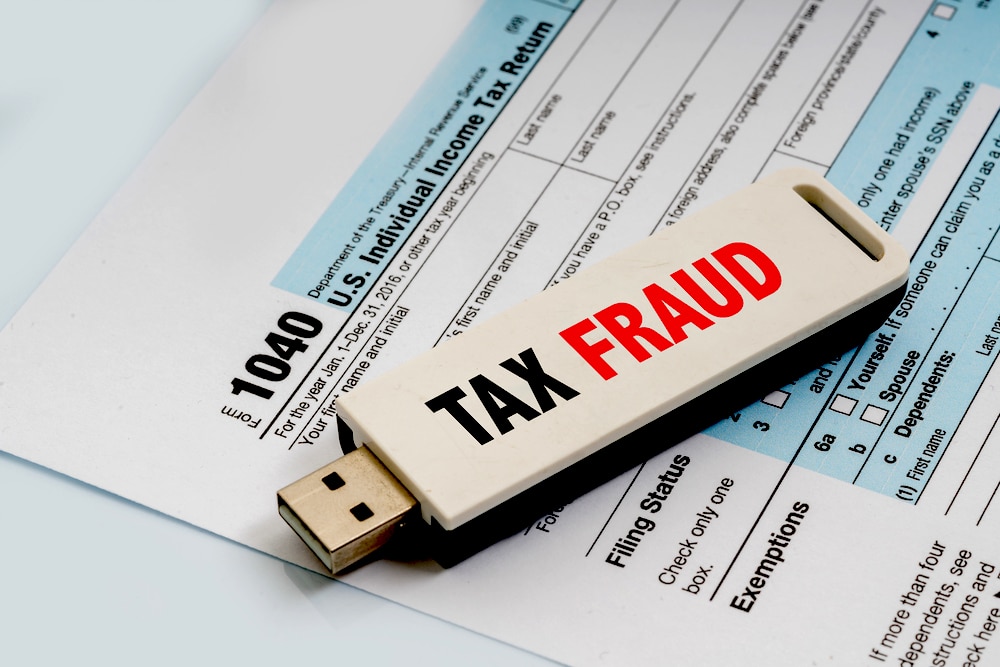Blog > Tax Legislation amp Proposals > EXPOSED! What Is Tax Fraud?
EXPOSED! What Is Tax Fraud?
October 27, 2023 - Friendly Tax Expert

Tax fraud is a deliberate and intentional act where an individual or business entity manipulates information on their tax return to reduce their tax liability. Rather than fulfilling their obligation to pay the correct amount of taxes, it involves cheating on a tax return to evade tax obligations. It goes beyond simple mistakes or errors and involves willfully taking actions to avoid paying taxes.
The Internal Revenue Service (IRS) in the United States defines tax fraud as intentionally misrepresenting or withholding data on a tax return. Taxpayers have a legal duty to voluntarily file their tax returns and accurately report their income, employment, sales, and excise taxes. Falsifying or withholding information in order to deceive the IRS is illegal and constitutes tax fraud.
Fraud may take various forms, such as claiming false deductions, categorizing personal expenses as business expenses, using a false Social Security number, or not reporting income. The IRS's Criminal Investigation unit specifically investigates cases of tax fraud. They look for evidence of willful actions by taxpayers, such as purposely failing to file income tax returns, misrepresenting their financial situation to claim false deductions or credits, intentionally avoiding payment of taxes, or preparing and filing false returns.
In the case of businesses involved in fraud, they may knowingly fail to file payroll tax reports, fail to report cash payments made to employees, hire payroll services that don't remit funds to the IRS, or neglect to withhold federal income tax or FICA taxes from employee paychecks. These actions aim to avoid reporting and paying the required payroll taxes.
To determine if fraudulent tax activity has occurred, investigators focus on indicators such as underreporting income, using false Social Security numbers, falsifying documents, or intentionally failing to pay taxes. These are crucial red flags that suggest fraudulent activity.
It is important to distinguish tax fraud from legitimate tax avoidance. While tax avoidance involves using legal means to minimize tax liability, tax fraud involves the intentional submission of false information or documents to deceive tax authorities.
Tax fraud is considered a serious offense and is investigated by the IRS. Taxpayers and businesses that engage in tax fraud face legal consequences for their actions.

What Is an Example of Tax Fraud?
Tax fraud encompasses various actions that involve intentionally falsifying information on tax returns to avoid paying the correct amount of taxes. Here are some specific examples of tax fraud:
- Underreporting Income: A common form of tax fraud is deliberately failing to report all income earned in individual income tax returns. This can include not reporting cash payments, income from side jobs, or offshore bank accounts. For instance, a self-employed individual may not report cash payments received for services rendered, thereby evading taxes on that income.
- False Deductions and Credits: Claiming false deductions or credits is another example of tax fraud. This can involve inflating expenses, fabricating receipts, or claiming deductions for expenses that are not legitimate business expenses. For example, a business owner might claim excessive business expenses or personal expenses as business deductions to reduce their tax liability.
- Identity Theft: Tax fraud can also occur when someone uses another person's Social Security number or other identifying information to file a fraudulent tax return and claim a refund. This can result in the legitimate taxpayer being unaware of the fraud until they attempt to file their own return.
- Offshore Tax Evasion: Keeping money in offshore accounts and not reporting the income derived from those accounts is a form of tax fraud. This involves intentionally hiding funds to avoid paying taxes on them. For instance, an individual may keep funds in an undisclosed offshore account and not report the interest or investment gains generated by those funds.
- Payroll Tax Fraud: Businesses can engage in tax fraud by not properly reporting payroll taxes or withholding taxes from employee paychecks. They may fail to file payroll tax reports, intentionally misclassify employees as independent contractors to avoid paying certain taxes, or not report cash payments made to employees.
These are just a few examples of tax fraud, highlighting both individual and business scenarios. It is important to note that tax fraud is illegal and can result in severe penalties, including fines, imprisonment, and reputational damage.

While there are people and businesses who intentionally engage in tax fraud, there are also cases where individuals may unintentionally commit tax fraud due to ignorance of tax laws or guidance from dishonest advisors. It is crucial for taxpayers to understand their legal obligations and accurately report their income and expenses to avoid falling into the trap of tax fraud.
Avoid Tax Fraud by Consulting with Tax Professionals
If you have any issues regarding your taxes, it's best to consult with a tax professional to ensure that you are fulfilling your tax obligations accurately and legally. Tax professionals can provide guidance on tax planning strategies and help you avoid potential audit triggers.
Additionally, seeking the advice of a tax professional can also help you identify any red flags that may indicate potential fraudulent activity. By staying compliant with tax laws and regulations, you can avoid the consequences of tax fraud and maintain your financial integrity.
Get in touch with us today to learn more about how we can help you stay compliant with your taxes and avoid potential fraud risks.
